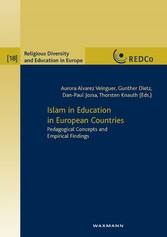Suchen und Finden
Service
Mehr zum Inhalt

Islam in Education in European Countries. Pedagogical Concepts and Empirical Findings
Content
6
Foreword
8
References
11
Introduction
12
References
15
Islam and Education in Spain
16
1. Introduction
16
2. A brief overview of the history of Islam and Muslims in Spain
16
3. Empirical findings for IRE
26
4. Teaching Islam in school: pedagogical reflections
38
5. Concluding remarks
48
References
49
Acronyms used
51
Islam within the Framework of “Laïcité”
52
1. Introduction
52
2. A brief overview of Islam and Muslims in France
52
3. Empirical findings related to Muslims teenagers
57
4. Teaching Islam at school: pedagogical remarks
62
5. Conclusion
68
References
68
Islam in Education in the Netherlands
70
1. Introduction
70
2. The perception of Islam in the Netherlands
71
3. Islam and the Dutch educational system
76
4. Islamic schools
82
5. Discussion and conclusions
90
References
91
A Qualitative Narrative of the Transition from Independent to Voluntary Aided Status
96
1. The context of England and Wales
97
2. The rationale behind Muslim schools: a theological understanding of Islam
97
3. Introducing School A: origins of the school
98
4. Nasira’s background and role in School A
99
5. Background of intake at School A
100
6. Positioning Muslim schools in the independent sector: an empirical context
101
7. Changing nature of School A’s resources over time
102
8. Specific vales at School A
103
9. Ethos of the school over time
105
10. Voluntary aided status in action: the national curriculum
106
11. Voluntary aided status in action: Islamicising the curriculum
107
12. Learning practices by example
108
13. Language in everyday school life and appointing Non- Muslim staff
109
14. Final experiences at School A
111
15. Conclusion: what does the term ‘Muslim school’ really refer to?
112
References
113
Emancipation or Disengagement? Islamic Schools in Britain and the Netherlands
114
1. Introduction
114
2. Islamic schools and educating Muslim children in England and the Netherlands
115
3. Islamic schools, the national curriculum and the “ Islamisation project”
118
4. Religious instruction and the creation of an “Islamic ethos”
120
5. Islamic schools, democratic citizenship and social cohesion
122
6. Conclusions
125
References
129
Muslim Students Views on Religion and Education
132
1. Introduction
132
2. Personal views and experiences with religion
133
3. Religion in school
142
4. Impact of religion in society in the views of students
150
5. Summary and conclusions
154
References
157
List of authors
160
Alle Preise verstehen sich inklusive der gesetzlichen MwSt.









